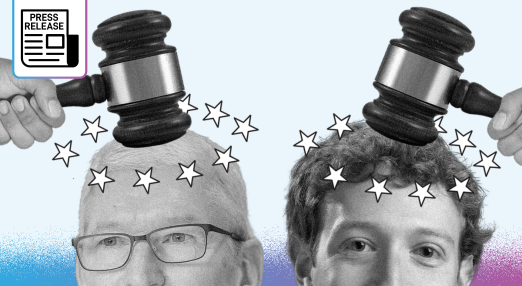Information democracy
Powerful companies and governments control the way the internet and new technologies are deployed. These actors blur the lines on corporate power in ways that have tremendous impact on people and democracies. The dominant business model of ‘Big tech’ platforms is based on surveillance, polarization and power imbalances. This ‘surveillance capitalism’ has had a global impact on democracy. For example, state and private actors can use the internet and technologies to spread political disinformation, to manipulate electoral results, to attack human rights defenders and to limit civic space.
Filter resources
-

EDRi-gram, 10 July 2025
What has the EDRis network been up to over the past two weeks? Find out the latest digital rights news in our bi-weekly newsletter. In this edition: European Commission must champion the AI Act, EDRi pushes back against risky GDPR deregulation, & more!
Read more
-

#PrivacyCamp25: Call for Sessions open
Our rights and freedoms – online and offline – are facing unprecedented threats. Recognising this as a collective struggle, we want to explore the theme Resilience and Resistance in Times of Deregulation and Authoritarianism for this edition of Privacy Camp. The 13th edition of Privacy Camp is set to take place on 30 September 2025.
Read more
-

EDRi-gram, 25 June 2025
What has the EDRis network been up to over the past two weeks? Find out the latest digital rights news in our bi-weekly newsletter. In this edition: The case for a spyware ban, EDRi 2025-2030 strategy, EU must reassess Israel’s adequacy status, & more!
Read more
-

The EDRi network adopts its 2025-2030 Strategy
The EDRi network adopted its 2025-2030 strategy at the General Assembly in Paris in May 2025. In this blogpost, EDRi’s Executive Director, Claire Fernandez, lays out the year-long journey and the work on many people it took to get us to this important milestone, and some highlights from our objectives and approach moving forward.
Read more
-

French Administrative Supreme Court illegitimately buries the debate over internet censorship law
In November 2023, EDRi and members filed a complaint against the French decree implementing the EU regulation addressing the dissemination of 'terrorist content' online. Last week, the French supreme administrative court rejected our arguments and refused to refer the case to the Court of Justice of the European Union.
Read more
-

EDRi-gram, 12 June 2025
What has the EDRis network been up to over the past two weeks? Find out the latest digital rights news in our bi-weekly newsletter. In this edition: UK data adequacy under scrutiny, ProtectEU strategy a step further towards digital dystopia, and more!
Read more
-

EDRi-gram, 28 May 2025
What has the EDRis network been up to over the past two weeks? Find out the latest digital rights news in our bi-weekly newsletter. In this edition: Reopening the GDPR is a threat to our rights, 6 years of fighting censorship by Meta in Poland, & more!
Read more
-

EDRi-gram, 7 May 2025
What has the EDRis network been up to over the past two weeks? Find out the latest digital rights news in our bi-weekly newsletter. In this edition: Apple & Meta fined for breaching DMA, civil society urges EU to act against Hungary’s pride ban, & more!
Read more
-

Showing your ID to get online might become a reality – a closer look at the EU’s new age verification app
Coming to a website near you this summer: the European Commission is close to a ‘solution’ that could force people to use their government-issued ID to get online. EDRi and EFF’s concerns about threats to everyone’s privacy and data protection, a chilling effect on access to information, and digital exclusion – harming the already most marginalised in society - remain unsolved.
Read more
-

Commission slams Apple and Meta for breaching the Digital Markets Act, doesn’t stick the landing with fines
The European Commission has shown some teeth with the EU’s digital rulebook by slamming tech giants Apple and Meta with fines, and an order to stop the infringing behaviour. While we commend the strong stance, we're concerned about whether the low fines will actually lead to change of behaviour from the tech giants.
Read more
-

EDRi-gram, 16 April 2025
What has the EDRis network been up to over the past two weeks? Find out the latest digital rights news in our bi-weekly newsletter. In this edition: Challenging data retention regime in Poland, Ljubljana’s municipal surveillance, and more!
Read more
-

Civil society files DSA complaint against Meta for toxic, profiling-fueled feeds
Civil society organisations Bits of Freedom, Convocation Design + Research, European Digital Rights (EDRi), and Gesellschaft für Freiheitsrechte (GFF) are filing a complaint against Meta for violating the Digital Services Act (DSA).
Read more
